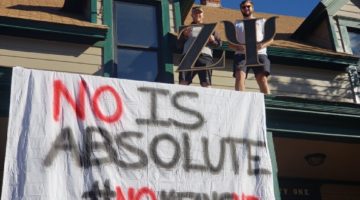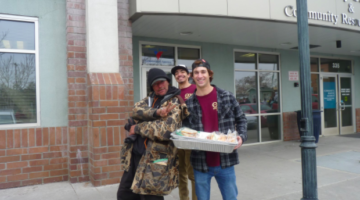
Photo provided by fairfieldcitizenonline.com
A man moves furniture out of the Sigma Alpha Epsilon house at the University of Oklahoma after the chapter was kicked off campus when a racist video surfaced of members using the “N” word. Two students were ultimately expelled from the school for their involvement.
It’s a phenomenon that has been happening over the past few months — major news outlets brandished with horrifying headlines that read “Another Fraternity Suspended,” with abhorrent details to follow. From racism to hazing, it seems that Greek Life has come under fire in a way that has been unprecedented throughout our lifetimes. The media focus on Greek Life has shifted away from its core values and emphasis on philanthropy in favor of a much darker and more sinister portrayal of the chapters that are destroying college students across the nation.
At this point, you have probably seen the disgusting video of former members of Sigma Alpha Epsilon at the University of Oklahoma gleefully chanting the “N” word on a full bus full of white students. The nine-second video swept the Internet, offending just about any person with a heart and brain. Not only did it reflect the poor values of that specific chapter, but it represented an unfortunate lack of compassion in a time when race relations are at the forefront of American society.
In response, celebrities, media outlets and cultural leaders alike have banded together calling for the removal of the Greek system from college campuses altogether. However, I challenge those who criticize the system to ask themselves if it is truly a reflection of the fraternity’s core values or simply the result of a groupthink mentality. Yes — groupthink tends to be the major problem associated with fraternities and sororities, but the problem persists with any large coalition of people centered around one major goal.
SAE’s national headquarters bases their organization on the principles of being a gentleman. It has been a leader in the Greek community, removing its pledge process with the intent of minimizing hazing practices. Despite the lack of attention to these principles at UO, the organization has often been a force for good in the lives of many young men seeking a brotherhood that would transcend the college experience.
While many feel the need to find someone to blame, I stand strongly by the belief that SAE, as a national organization, is far from the culprit. Just days after the video surfaced, Nevada’s local SAE chapter took to Facebook to express their disgust with UO’s actions in saying, “Greek life is meant to bring out the best in us and bring together students of all sorts no matter the race, religion, sexual orientation or any other classifying characteristic.” As many members of Nevada’s Greek community understand, our local chapter accepts men of all kinds in an attempt to form a brotherhood that reflects the values of their founder, Noble Leslie DeVotie, among others.
Moreover, Nevada’s SAE won Homecoming this year after sacrificing a significant part of its social budget in favor of donating to the state’s homeless community. The members have been some of the most vocal in speaking out against the video, putting out the message that their chapter would never act in a similar way.
Beyond SAE, Greek members represent some of the most charitable young people across the nation. An article by Elite Daily pointed out that, “Undergraduate members give an annual average of $7 million and 850,000 hours toward charitable causes.” Even further, the article pointed out that Greek students are more inclined to graduate with, “71% of Greeks graduating versus 50% of non-Greeks.”
While the debate could go back and forth, with statistics stacking up on both sides, it would be impossible to deny the good that members of fraternities and sororities do for society. The organizations empower young people with a mechanism to give back, take on leadership and improve the society around them.
With that said, I must also admit that chapters can be used as a mechanism for the spread of hateful groupthink. However, with the power that national and international Greek organizations have, it is also important to have a discussion about how society may use these groups for the betterment of people.
As a proud member of a Greek organization at Nevada, I can attest that, while we may occasionally bicker over stolen composites or Greek Week point systems, none of the chapters on this campus would be caught expounding such hateful ideas. Though no chapter is perfect, we aspire to live up to the expectations of ourselves and the national organizations we represent.
We are agents of change within the community, using our organizations as a mechanism for fighting prejudices as opposed to upholding them. Though the first wave of the Civil Rights Movement ended years ago, we live in a time still plagued by the prejudices of our families from a different time. For that reason, it is critical that we use Greek communities to start conversations about tolerance, instead of advocating for their removal.
As is the case with any organization, Greek or not, the potential for groupthink is always a threat, but removing the group only addresses the agent of the prejudice — not the prejudice itself. Situations like the UO video only serve to remind Greek communities of their central values and warn the chapters of the consequences when ignoring their guiding principles. Most importantly, UO’s situation starts a conversation about tolerance that may never have existed absent a community with which to discuss it.
It was right to remove SAE from UO’s campus as an example to the rest of the country. It sends a message that hate has no place in our society, and we must constantly remind ourselves that we have a role in preventing it. With that said, there is power in numbers. Communities of all kinds, whether they are Greek or not, must maximize their potential to make the world a better place. Regardless of the letters, crests or names you brandish on your chest, communities can make a difference; it’s just about taking the opportunities to do so.
Daniel Coffey studies journalism. He can be reached at dcoffey@sagebrush.unr.edu and on Twitter @TheSagebrush.











